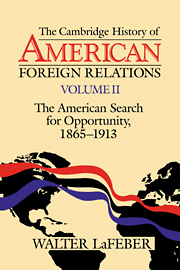Book contents
- Frontmatter
- 1 Springboards and strategies
- 2 The second Industrial Revolution at home and abroad
- 3 Race for empire
- 4 “America Will Take This Continent in Hand Alone”
- 5 Crossing the oceans
- 6 1893–1896: chaos and crises
- 7 The empire of 1898 – and upheaval
- 8 Pacific empire – and upheaval
- 9 Theodore Roosevelt: conservative as revolutionary
- 10 William Howard Taft and the age of revolution
- Conclusion: The 1865–1913 Era Restated
- Bibliographic Essay
- Index
- THE CAMBRIDGE HISTORY OF AMERICAN FOREIGN RELATIONS
- References
8 - Pacific empire – and upheaval
Published online by Cambridge University Press: 28 March 2008
- Frontmatter
- 1 Springboards and strategies
- 2 The second Industrial Revolution at home and abroad
- 3 Race for empire
- 4 “America Will Take This Continent in Hand Alone”
- 5 Crossing the oceans
- 6 1893–1896: chaos and crises
- 7 The empire of 1898 – and upheaval
- 8 Pacific empire – and upheaval
- 9 Theodore Roosevelt: conservative as revolutionary
- 10 William Howard Taft and the age of revolution
- Conclusion: The 1865–1913 Era Restated
- Bibliographic Essay
- Index
- THE CAMBRIDGE HISTORY OF AMERICAN FOREIGN RELATIONS
- References
Summary
“We are all jingoes now,” the New YorkSun wrote immediately after the 1898 war, “and the head jingo is the Hon. William McKinley.” The term “jingo” came from an 1878 British music hall song about “jingo” Englishmen who were aching to fight Russia. The term also came from the Japanese empress, Jingo, who sometime before the fourth century A.D. invaded Korea in an uproar of nationalism, war, and all-out expansionism. By the late 1890s it was a household term. Given the lineage, however, McKinley was no “jingo.” He disdained seizing parts of the Spanish empire and approached Cuba, Puerto Rico, and – above all – the Philippines incrementally and with a superb politicians sensitivity to the need for consensus. His objective was not a colonial empire but the minimum territory needed to obtain his conquest of world markets, along with the taking of strategic points necessary to protect that conquest. To achieve such a conquest, however, McKinley was willing to endure disorder and bear upheavals, even full-scale insurrection in the Philippines, or the threat of becoming involved in war on the Asian mainland.
Destroying Order for Opportunity: Annexing the Philippines
On May 4, 1898, even before he received official word of Admiral George Dewey’s conquest of Manila, the president ordered 5,000 troops to embark for the occupation of the Philippines “and such service as may be ordered hereafter.” These troops quickly encountered the forces of Emilio Aguinaldo, who had led the Filipino independence fight in 1896–7 against Spain.
- Type
- Chapter
- Information
- The Cambridge History of American Foreign Relations , pp. 156 - 182Publisher: Cambridge University PressPrint publication year: 1993



